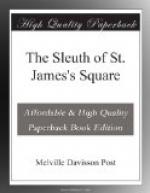Barclay paused.
“Queer chap, Tavor. He was the best all round explorer in the world. I bar nobody. Charlie Tavor could take a nigger and cross the poisonous plateau south west of the Libyan desert. I’ve backed him. I know . . . but he had no business sense, anybody could fool him. He found the stock of bar silver on the west face of the Andes that made old Nute Hardman a quarter of a million dollars, clear, after the cursed beast had split it a half dozen ways with a crooked South American government.”
Barclay’s teeth set and he jerked up his clinched hand.
“It was a damned steal, Sir Henry. A piece of low down, dirty robbery; and it was like taking candy away from a child . . . . `Sign here, Mr. Tavor,’ and Charlie would scrawl on his fist . . . . Some people think there’s no hell, but what’s God Almighty going to do with Old Nute?”
He flung out his hand again.
“Still the thing didn’t dent Charlie. He never missed a step. `Don’t bother, Barclay, old man,’ he’d say, `I’ll find something else,’ and then he’d go off into this dream he had of coming back when he’d struck it, to the old home county in England and laying it over the bunch that had called him `no good.’ He never talked much, but I gathered from odds and ends that he was the black sheep in a pretty smart flock.
“Then, I’d stake him to a cheap outfit — not much, I’ve said he could push through the Libyan desert with a nigger — and he’d drop out of the world. It wasn’t charity. I got my money’s worth. The clay pots he brought me from Yucatan would sell any day for more cash than I ever advanced him.”
Barclay moved a little before the fire. I was listening in a big chair, my feet extended toward the hearth; a smoking jacket had replaced my dinner coat.
“It was five years ago, in London,” Barclay went on, “that I fitted Charlie out for his last adventure. He wanted to land in the gulf of Pe-chi-li and go into the great desert of the Shamo in Central Mongolia. You’ll find the Shamo all dotted out on the maps; but it’s faked dope. No white man knows anything about the Shamo.
“It’s a trick to lay off these great waste areas and call them elevated plateaus or sunken plateaus. You can’t go by the atlas. Where’s Kane’s Open Polar Sea and Morris K. Jessup’s Land? Still, Charlie thought the Shamo might be a low plain, and he thought he might find something in it. You see the great gold caravans used to cross it, three thousand years ago . . . and as Charlie kept saying, `What’s time in the Shamo?’
“Well, I bought him a kit of stuff, and he took a P. and O. through the Suez. I got a long letter from Pekin two months later; and then Charlie Tavor dropped out of the world. I went back to America. No word ever came from Charlie. I thought he was dead. I suppose a white man’s life is about the cheapest thing there is northwest of the Yellow River; and Charlie never had an escort. A coolie and an old service pistol would about foot up his defenses.




